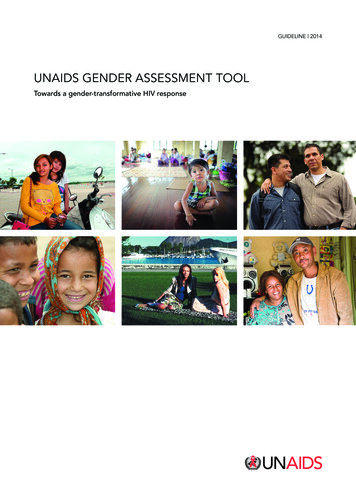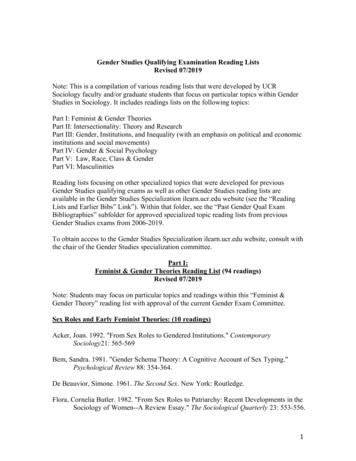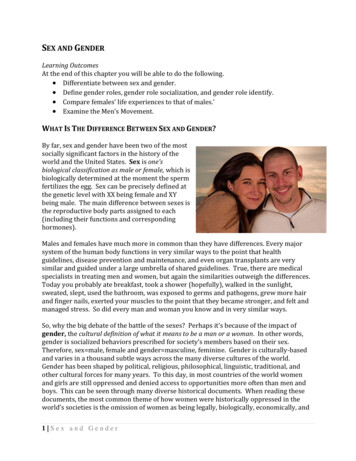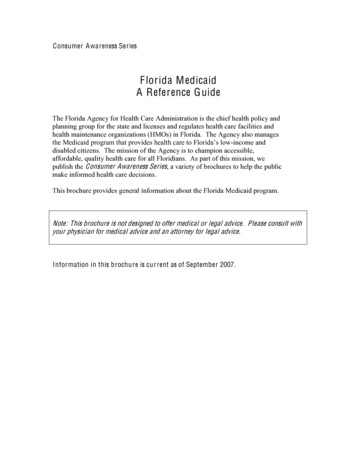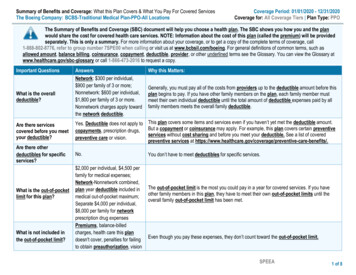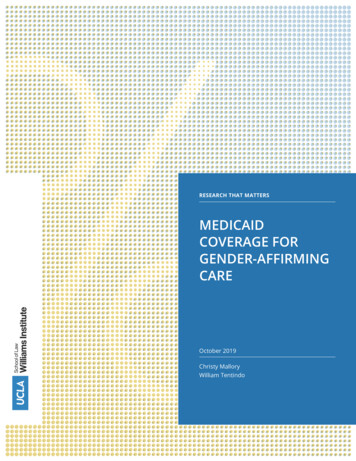
Transcription
RESEARCH THAT MATTERSMEDICAIDCOVERAGE FORGENDER-AFFIRMINGCAREOctober 2019Christy MalloryWilliam Tentindo
Medicaid Coverage for Gender-Affirming Care 1EXECUTIVE SUMMARYMedicaid beneficiaries who are transgender face a patchwork of policies across the U.S. that leavemany of them without access to coverage for gender-affirming care. Eighteen states and D.C. havechosen to specifically include coverage for gender-affirming care under their Medicaid programs orare in the process of extending coverage, while 12 states exclude coverage for such care and 20 stateshave not expressly addressed coverage. Gender-affirming care includes a range of services, such assurgical procedures, hormone therapy, and other forms of treatment related to gender transition.The Williams Institute estimates that: 1.4 million adults in the U.S. identify as transgender and approximately 152,000 of them areenrolled in Medicaid. Fewer than half (69,000) of transgender Medicaid beneficiaries have affirmative access tocoverage for gender-affirming care under express policies in state law. For 51,000 transgender Medicaid beneficiaries, coverage is uncertain because they live in stateswhere the laws are silent on coverage for gender-affirming care. An estimated 32,000 transgender Medicaid beneficiaries live in states with express bans thatdeny access to covered gender-affirming care.Although regulations issued by the U.S. Department of Health & Human Services in 2016 bar Medicaidprograms from categorically excluding insurance coverage for all types of gender-affirming care, theDepartment has recently proposed to eliminate these provisions. Nonetheless, a number of laws andpolicies continue to support access to gender-affirming care through Medicaid programs, includingthe Affordable Care Act, the Social Security Act, and the U.S. Constitution. Bans have been successfullychallenged in court under these laws in several states, resulting in changes to Medicaid policies thathave increased care and coverage for transgender beneficiaries.Additional policy changes in states that still have bans or lack clear language addressing coveragewould ensure that transgender Medicaid beneficiaries have access to coverage for necessary medicalcare no matter where they live. In addition, more transgender people could benefit from Medicaidcovered services if all states adopted Medicaid expansion and if barriers to accessing public benefits,such as requirements pertaining to identity documents, were removed.
Medicaid Coverage for Gender-Affirming Care 2COVERAGE FOR GENDER-AFFIRMING CARE IN STATEMEDICAID PROGRAMSMedicaid is a federally mandated program, implemented by states, which ensures access tohealth care for those low-income adults and children who qualify.1 The program is funded with acombination of federal and state funds.2 States must implement their Medicaid programs consistentwith federal law, though they retain some flexibility in the design and administration of theirprograms, including setting eligibility criteria.3Federal law does not expressly direct states to either include or exclude coverage for gender-affirmingcare under their state Medicaid programs.4 Some states have chosen to specifically include coveragefor gender-affirming care under their Medicaid programs, while other states exclude such careor have not expressly addressed coverage, creating a patchwork of policies affecting transgenderMedicaid beneficiaries across the U.S.AFFIRMATIVE COVERAGE FOR GENDER-AFFIRMING CAREEighteen states and D.C. have chosen to specifically include coverage for gender-affirming care undertheir Medicaid programs or are in the process of extending coverage. The 17 states are: California,Colorado, Connecticut, Maine, Maryland, Massachusetts, Minnesota, Montana, Nevada, New Jersey,New York, Oregon, Pennsylvania, Rhode Island, Vermont, Washington, and Wisconsin. One additionalstate, Illinois, is currently developing an administrative policy that will expressly state that Medicaidcovers gender-affirming care. All of these policies have been adopted within the past six years, withCalifornia being the first state to issue this type of policy in 2013. The policies ensure that transgenderMedicaid beneficiaries have access to a range of gender-affirming care, including gender-affirmingsurgery and hormone treatment, though there may be some forms of gender-affirming treatmentthat are not included in the policies.California. In 2013, the California Department of Health Care Services issued guidance expresslystating that Medicaid covers gender-affirming care.5 The agency re-issued guidance in 2016 remindingMedicaid health plans that they are required to cover gender-affirming care for beneficiaries and1Ctr. for Medicare & Medicaid Servs., U.S. Dep’t. of Health & Human Servs., Program History, Medicaid.gov, index.html (last visited June 19, 2019).2Ctr. for Medicare & Medicaid Servs., U.S. Dep’t. of Health & Human Servs., Financial Management, Medicaid.gov, https://www.medicaid.gov/medicaid/finance/ (last visited June 19, 2019).3See, e.g., Ctr. for Medicare & Medicaid Servs., U.S. Dep’t. of Health & Human Servs., Eligibility, Medicaid.gov, x.html (last visited July 23, 2019).4For benefits that states are required to provide under federal law, see Ctr. for Medicare & Medicaid Servs., U.S. Dep’t.of Health & Human Servs., Mandatory & Optional Medicaid Benefits, Medicaid.gov, -benefits/index.html (last visited Aug. 15, 2019).5All Plan Letter 13-011: Ensuring Access to Transgender Services from Toby Douglas, Dir., Cal. Dep’t. of Health Care Servs.,to All Medi-Cal Managed Care Health Plans (Sept. 25, 2013), DAPLsandPolicyLetters/APL2013/APL13-011.pdf (superseded by All Plan Letter 16-013).
Medicaid Coverage for Gender-Affirming Care 3explaining that federal regulations implementing the Affordable Care Act prohibit discriminationbased on gender identity in health care, including in state Medicaid programs.6Colorado. In 2017, the Colorado Department of Health Care Policy and Financing issued regulationsexpressly stating that Medicaid covers gender-affirming care.7 The Department most recently revisedthe rule in 2019 to reduce the burden placed on transgender beneficiaries seeking treatment for hairremoval. The revision was effective as of June 30, 2019.8Connecticut. In 2015, the Connecticut Department of Social Services issued guidance expressly statingthat Medicaid covers gender-affirming care.9 The guidance has been updated and expanded severaltimes to reduce barriers or burdens for transgender people seeking care. The guidance was updatedmost recently in March 2019 to provide for coverage of gender-affirmation surgery intended to refineresults of a previous surgery that created a functional impairment.D.C. In 2015, the D.C. Department of Health Care Finance issued a bulletin expressly stating thatMedicaid covers gender-affirming care.10Illinois. In 2019, the Illinois Department of Healthcare and Family Services announced that it isdeveloping a regulation that will explicitly state that Medicaid covers gender-affirming care.11 TheDepartment expects the rule to go into effect following a public comment period.Maine. In 2019, the Maine Department of Health and Human Services issued a regulation expresslystating that Medicaid covers gender-affirming care.12Maryland. In 2015, the Maryland Department of Health issued a regulation expressly stating thatMedicaid covers gender-affirming care.136All Plan Letter 16-013: Ensuring Access to Medi-Cal Services for Transgender Beneficiaries from Jennifer Kent, Dir., Cal. Dep’t.of Health Care Servs., to All Medi-Cal Managed Care Health Plans (Oct. 6, 2016), DAPLsandPolicyLetters/APL2016/APL16-013.pdf.710 Colo. Code Regs. § 2505-10 8.735 (LexisNexis 2019); Maximillian Cabrera & Cara Cheevers, Gender-Affirming CareCovered by Health First Colorado, One Colo. (June 2019), 6/ColoradoTransgender-Medicaid-benefit.pdf.8Med. Servs. Bd., Revision to the Medical Assistance Benefits Rule Concerning Transgender Services, Colo. Dep’t. Health CarePol’y & Financing (May 10, 2019), ial%20-%20Apr%202019.pdf.9Provider Policies & Procedures: Gender Affirmation Surgery, Husky Health Conn. (Mar. 27, 2019), https://www.huskyhealthct.org/providers/provider postings/policies procedures/Gender Affirmation Surgery.pdf.10Non-Discrimination in the District’s State Medicaid Program Based on Gender Identity or Expression, Dep’t. Health Care Fin.(Feb. 27, 2014), derIdentity.11Press Release, Ill. Dep’t. of Healthcare & Family Servs., Fulfilling Gov. Pritzker’s Commitment to Healthcare Equity,Medicaid to Provide for Gender Affirming Surgery (Apr. 5, 2019), aid to provide for gender affirming surgery.pdf.12MaineCare Benefits Manual, Ch. 1 § 90, MaineCare (Sept. 16, 2019).13Md. Code Regs. 10.09.67.26-3 (2019).
Medicaid Coverage for Gender-Affirming Care 4Massachusetts. In 2015, MassHealth issued guidance expressly stating that Medicaid covers genderaffirming care.14 The policy was most recently updated in 2019.15Minnesota. In 2016, a state court in Minnesota held that the ban on coverage for gender-affirmingsurgical care under the state’s Medicaid program violated Minnesota’s constitution.16 A few monthslater, the Minnesota Department of Human Services implemented the court’s decision by issuingguidance expressly stating that Medicaid covers gender-affirming care.17Montana. In 2017, the Montana Department of Health & Human Services issued guidance expresslystating that Medicaid covers gender-affirming care.18 The agency explained that federal regulationsimplementing the Affordable Care Act prohibit discrimination based on gender identity in health care,including in state Medicaid programs.Nevada. In 2018, the Nevada Department of Health and Human Services announced that Medicaidcovers gender-affirming care.19New Jersey. In 2017, the legislature of New Jersey enacted a statute requiring Medicaid coverage forgender-affirming care.20New York. In 2015, the New York State Department of Health issued regulations expressly statingthat Medicaid covers gender-affirming care. Several transgender Medicaid beneficiaries challengedthe rule in federal district court, arguing that its denial of coverage for minors and its exclusion forsurgeries deemed “cosmetic” violated their rights under the federal Medicaid statute.21 The courtagreed that the categorical ban on cosmetic surgeries violated federal Medicaid laws by foreclosingthe availability of treatments that may be medically necessary for some individuals. The courtdeclined to hold that the age restriction violated federal Medicaid laws. In response to the decision,the Department of Health amended its regulations to remove the exclusion for cosmetic surgery.22Because many states exclude coverage for treatment deemed “cosmetic” even if they cover otheraspects of gender-affirming care, New York’s policy is among the most expansive.14MassHealth, Guidelines for Medical Necessity Determination for Gender-Affirming Surgery, Mass.gov (July 31, 2019), -genderaffirmingsurgery.pdf.15Id.16OutFront Minnesota v. Piper, No. 62-CV-15-7501 (Minn. Dist. Ct. Nov. 14, 2016).17Gender-Confirming Surgery, Minn. Dep’t. Hum. Servs. (Feb. 2, 2017), https://www.dhs.state.mn.us/main/idcplg?IdcService GET DYNAMICCONVERSION&RevisionSelectionMethod LatestReleased&dDocName DHS-292552.18Federal Final Rule, “Nondiscrimination in Health Program and Activities” and Implication for Coverage of Services Related toGender Transition, Mont. Dep’t. Pub. Health & Hum. Servs. (May 26, 2017), ertransition05252017.pdf.19Gender Reassignment Codes 54400 through 54417 and 19318 May be Billed, Nev. Dep’t. Health & Hum. Servs. (May 8, er/web announcement 1532 20180223.pdf.20N.J. Stat. Ann. § 30:4D-9.1 (2017).21Cruz v. Zucker, 195 F. Supp. 3d 554 (S.D.N.Y. 2016).22N.Y. Comp. Codes R. & Regs. tit. 18, § 505.2 (2016).
Medicaid Coverage for Gender-Affirming Care 5Oregon. In 2015, the Oregon Health Authority issued a policy expressly stating that Medicaid coversgender-affirming care.23 The policy was most recently updated in 2018.24Pennsylvania. In 2016, the Pennsylvania Department of Human Services issued a bulletin expresslystating that Medicaid covers gender-affirming care.25 The agency explained that federal regulationsimplementing the Affordable Care Act prohibit discrimination based on gender identity in health care,including in state Medicaid programs.Rhode Island. In 2015, the Rhode Island Executive Office of Health and Human Services issuedguidance expressly stating that Medicaid covers gender-affirming care.26Vermont. In 2008, the Vermont Agency of Human Services issued guidance expressly stating thatMedicaid covers gender-affirming care.27 The guidance has been updated and expanded severaltimes to reduce barriers or burdens for transgender people seeking care. In October 2019, the agencyproposed a new regulation addressing coverage for gender-affirming care.28 The rule further expandsMedicaid coverage, including by providing coverage for gender affirmation surgery to emancipatedminors and other minors with parental consent.Washington. In 2015, the Washington State Health Care Authority issued a regulation expresslystating that Medicaid covers gender-affirming care.29Wisconsin. In 1996, the Wisconsin Department of Health Services issued a regulation expresslyexcluding gender-affirming care from Medicaid coverage.30 In 2019, a federal district court inWisconsin ruled that the ban violated the Affordable Care Act, the Medicaid provisions of the SocialSecurity Act, and the federal constitution.31 As a result, transgender Medicaid beneficiaries in the statenow have access to coverage for gender-affirming care.23Prioritized List of Health Services (Annotated), Or. Health Auth. (Jan. 1, 2015), 20Services.pdf.24Prioritized List of Health Services (Annotated), Or. Health Authority (Oct. 1, 2018), %20Services.pdf.25Medical Assistance Bulletin from Leesa M. Allen, Deputy Sec’y Office of Med. Assistance Programs, Penn. Dep’t.of Human Servs., to Providers (July 18, 2016), ts/bulletinadmin/c 233793.pdf.26Gender Dysphoria/Gender Nonconformity Coverage Guidelines, R.I. Executive Off. Health & Hum. Servs. (Oct. 2015), /genderdysphoria.pdf.27The Department of Vermont Health Access Medical Policy: Gender Reassignment Surgery, Dep’t. Vt. Health Access (Nov. 16,2016), ignment-surgery-w-icd-10-coded-111616.pdf.2812-9 Vt. Code. R. § 4.238 (2019), ted.pdf (proposed).29Wash. Admin. Code § 182-531-1675 (2015).30Wis. Admin. Code DHS §§ 107.03(23)–(24) (2019).31Flack v. Wisc. Dept’ of Health Servs., No. 18-cv-309-wmc (W.D. Wisc. Aug. 16, 2019).
Medicaid Coverage for Gender-Affirming Care 6LAW IS SILENT ON COVERAGE FOR GENDER-AFFIRMING CARETwenty states have no express statute or administrative policy addressing coverage for genderaffirming care under their Medicaid programs. These 20 states are: Alabama, Arkansas, Delaware,Florida, Idaho, Indiana, Kansas, Kentucky, Louisiana, Michigan, Mississippi, New Hampshire, NewMexico, North Carolina, North Dakota, Oklahoma, South Carolina, South Dakota, Utah, and Virginia.Some of these states previously had policies expressly excluding gender-affirming care, but haveremoved those exclusions. For example, within the last few years, New Hampshire32 amended itsregulations to remove the ban on gender-affirming care.Although these 20 states lack policies clearly stating that gender-affirming care is covered, servicesmay still be approved for coverage. Transgender people in a few of these states have reported beingable to access Medicaid coverage for some types of gender-affirming care. But even in these states,transgender beneficiaries report experiencing significant barriers, such as being denied coverage forcertain treatments or having different doctors provide different information pertaining to coverage,that likely would not be present if an express policy providing for coverage were in place.33LAW EXPRESSLY EXCLUDES COVERAGE FOR GENDER-AFFIRMING CARETwelve states have express bans that deny access to coverage for gender-affirming care under theirMedicaid programs, either by statute or administrative policy. These 12 states are: Alaska, Arizona,Georgia, Hawaii, Iowa, Missouri, Nebraska, Ohio, Tennessee, Texas, West Virginia, and Wyoming. Mostof these policies specifically exclude coverage for transition-related surgeries. However, some policiesare more broadly written and may also exclude hormone treatment and other types of genderaffirming care.Alaska. In 2010,34 the Alaska Department of Health and Human Services issued a regulation expresslyexcluding “transsexual surgical procedures or secondary consequences” from Medicaid coverage.35In 2019, a transgender woman who had been denied care under Alaska’s Medicaid program filed alawsuit challenging the regulation.36 That case is still in litigation.32Final Proposal to Delete He-W 531.06(g) from N.H. Code Admin. R. (Sept. 27, 2017), /NH-trans%20exclusion%20removal%20reg.pdf.33See, e.g., Indiana Medicaid and Transgender Healthcare, Ind. Transgender Network (June 25, 2015), news/indiana-medicaid-and-transgender-healthcare/; Leslie NewellPeacock, The Real Transgender Crisis in Arkansas: Health Care, ark. times (May 11, 2017), e.34New Medicaid Coverage and Payment Regulations: 7 AAC 105 - 7 AAC 160, Ala. Dep’t. Health & Soc. Servs. (Feb. 1, Update 02012010 Medicaid Coverage and Payment Regulations 7AAC 105-160.pdf.35Alaska Admin. Code tit. 7 § 110.405(d)(5) (2019).36Renee Gross, Lawsuit Challenges State’s Medicaid Policy Denying Transgender-Related Health Care Coverage, KBBI (Mar. 6,2019), lth-carecoverage-0.
Medicaid Coverage for Gender-Affirming Care 7Arizona. Since at least 2010,37 the Arizona Health Care Cost Containment System has had a policyexpressly excluding “treatment of gender dysphoria including gender reassignment surgeries” fromMedicaid coverage.38Georgia. In 1993, the Georgia Department of Community Health issued a policy expressly excluding“transsexual surgeries” from Medicaid coverage.39Hawaii. Since at least 1993,40 the Hawaii Department of Human Services has had a policy excludinggender-affirming care from Medicaid coverage. While the current policy still generally excludesgender-affirming care from coverage, which includes medical treatments, surgical procedures,hormones, and other medications, it does allow coverage specifically for medication related to gendertransition if the beneficiary has a court order affirming his or her gender change.41Iowa. In 1994,42 the Iowa Department of Human Services issued a regulation expressly excludinggender-affirming care from Medicaid coverage.43 In 2019, the Iowa Supreme Court held that theexclusion violated the state’s non-discrimination law, which prohibits discrimination based ongender identity in public accommodations, and as such, could not be enforced.44 The state legislatureresponded by passing an appropriations bill that included a provision stating that Iowa’s nondiscrimination law does not require Medicaid to cover gender-affirming surgeries or procedures.45The new law paves the way for the Department of Health to enforce the ban. The governor signed thebill in May 2019.Missouri. Missouri’s Physician Manual for Medicaid providers, last issued by the Missouri Departmentof Social Services in 2019, expressly excludes “surgical procedures for gender change” from Medicaidcoverage. 46Nebraska. In 1990, the Nebraska Department of Health and Human Services issued a regulationexpressly excluding “sex change procedures” from Medicaid coverage.4737Notice of Proposed Rulemaking, 20 Ariz. Admin. Reg. 709 (Mar. 21, 2014).38Ariz. Admin. Code § R9-22-205(B)(4)(a) (2019).39Georgia Medicaid State Plan Attachment 3.1-A, Ga. Dep’t Community Health, at 1c (Nov. 4, 1993), s/related files/document/State Plan Attachment 3.pdf.40Lawrence Miike, Health Insurance: The Hawaii Experience, U.S. Congress Off. Tech. Assessment (June 1993), https://ota.fas.org/reports/9327.pdf.41Id.42See Good v. Iowa Dep’t. of Human Servs., 924 N.W.2d 853 (Iowa 2019).43Iowa Admin. Code r. 441-78.1(4)(b)(2) (2019).44Good, 924 N.W. 2d 853.452019 Iowa Acts Ch. 85, at 45 (amending Iowa Code § 216.7 (2019)).46State of Missouri Physician Manual, MO HealthNet, at § 13.38 (Aug. 28, 2019) http://manuals.momed.com/collections/collection phy/print.pdf.47471 Neb. Admin. Code § 18-003.01(30) (2019).
Medicaid Coverage for Gender-Affirming Care 8Ohio. In 2015, the Ohio Department of Medicaid issued a regulation expressly excluding “gendertransformation” from Medicaid coverage.48Tennessee. In 2006,49 the Tennessee Department of Finance and Administration issued a regulationexpressly excluding “transsexual surgery” from Medicaid coverage.50Texas. Texas’s Medicaid Providers Manual, last issued in 2019, expressly excludes “sex changeoperations” from Medicaid coverage.51West Virginia. West Virginia’s Medicaid Provider Manual, last issued by the West Virginia Bureau ofMedical Services in 2005, expressly excludes “transsexual surgery” from Medicaid coverage.52Wyoming. Since at least 1992,53 the Wyoming Department of Health has had a regulation expresslyexcluding “transsexual surgery” from Medicaid coverage.5448Ohio Admin. Code 5160-2-03(A)(2)(e) (2019).49Tenn. Comp. R. & Regs. 1200-13-13.10(3)(b)(81) (2006).50Tenn. Comp. R. & Regs. 1200-13-13.10(3)(b)(86) (2019).51Texas Medicaid Provider Procedures Manual – September 2019, Tex. Medicaid & Healthcare Partnership, at § 1.11(2019), http://www.tmhp.com/Manuals HTML1/TMPPM/Current/index.html#t TMPPM%2F1 01 ProviderEnrollment%2F1 01 Provider Enrollment.htm%23TOC 1 11 Texas Medicaidbc-93&rhtocid 1 10.52West Virginia Medicaid Provider Manual, W. Va. Dep’t. Health & Hum. Resources, at § 161 (Jan. 1, 2005), /bms manuals Chapter 100.pdf.53048-0037-26 Wyo. Code R. § 5(j)(vii) (LexisNexis 1992).54048-0037-26 Wyo. Code R. § 5(x) (LexisNexis 2019); Medicaid Handbook, Wyo. Dep’t Health, at 17 (Oct. 2016), Medicaid-Handbook-10.01.2016.pdf.
Medicaid Coverage for Gender-Affirming Care 9IMPACT OF LAWS ADDRESSING MEDICAID COVERAGENUMBER OF TRANSGENDER ADULTS ENROLLED IN MEDICAIDUsing the best available data, we estimate that 152,000 transgender adults in the U.S. are enrolled inMedicaid. Fewer than half of transgender Medicaid beneficiaries (69,000) have guaranteed access tocoverage for gender-affirming care under express policies in state law. For around 51,000 transgenderMedicaid beneficiaries, coverage is uncertain because they live in states where the laws are silent onMedicaid coverage for gender-affirming care. An estimated 32,000 transgender Medicaid beneficiarieslive in states with express bans that deny access to covered gender-affirming care.Table 1. Medicaid enrollment of transgender adults, by stateSTATEAlabamaNUMBER OFTRANSGENDERADULTSTRANSGENDER ADULTS ENROLLED IN MEDICAIDGENDER-AFFIRMINGCARE COVEREDGENDER-AFFIRMINGCARE NOT COVERED22,5002,000Alaska2,700 ois49,750Indiana27,600IowaKansasNO POLICY ONGENDER-AFFIRMINGCARE9,000 ,000Louisiana20,9004,000Maine5,350 000 1,000 1,000
Medicaid Coverage for Gender-Affirming Care 10STATENevadaNew HampshireNUMBER OFTRANSGENDERADULTS12,700GENDER-AFFIRMINGCARE COVERED30,100New Mexico11,750New York78,600North Carolina44,7501,0003,0003,00015,0004,0001,650 3,8005,000Rhode Island4,250 1,000South DakotaTennesseeTexasUtah1,0002,0002,0002,150 00Washington32,850West 21,000Vermont1,397,250NO POLICY ONGENDER-AFFIRMINGCARE2,000OhioSouth CarolinaGENDER-AFFIRMINGCARE NOT COVERED4,500New JerseyNorth DakotaTRANSGENDER ADULTS ENROLLED IN MEDICAID 1,000 1,0002,0004,0002,0002,000 1,00069,00032,00051,000We reached these estimates using recent data from several sources. We relied on the Gallup DailyTracking Poll, a national population-based survey, to estimate the percentage of transgender peopleenrolled in Medicaid by state. Gallup does not allow disaggregation of transgender respondentsfrom the broader group of LGBT respondents, so we assume that transgender people are enrolledin Medicaid at the same rate as the LGBT population as a whole in each state. We then applied thesestate-level enrollment percentages to the number of transgender adults in each state from a priorWilliams Institute study, Age of Individuals Who Identify as Transgender in the United States, to reachestimates of the number of transgender Medicaid enrollees by state. Estimates were rounded to thenearest 1,000. For more details on the methodology used to calculate estimates, see page 20.LIMITATIONSOur calculations may underestimate the number of transgender adults enrolled in Medicaid dueto limited available data specifically on transgender people and their experiences. We relied ondata collected through the Gallup Daily Tracking Survey to estimate the number of enrollees bystate because it is a large, national probability survey that collects information about LGBT status
Medicaid Coverage for Gender-Affirming Care 11and insurance coverage. However, we are unable to separate out transgender respondents fromLGBT respondents as a whole due to the survey design. As a result, our calculations assume thattransgender adults enroll in Medicaid at the same rate as the broader LGBT population. Transgenderpeople may actually be enrolled in Medicaid at higher rates than cisgender LGB people because theyare more likely to live in poverty and have disabilities than cisgender people.55In addition, we do not consider the number of transgender adults who are currently eligible forMedicaid but not enrolled, or the number of transgender adults who would be newly eligible andenroll if their state adopted Medicaid expansion. Transgender adults who are currently eligible forMedicaid may not be enrolled for various reasons. For example, they may not enroll because genderaffirming services are not covered or because their identity documents do not accurately reflecttheir name and gender identity, making it difficult to access public benefits.56 At least some of theseadults may be more likely to enroll if their state Medicaid programs reduce barriers to access andaffirmatively offer coverage for a range of gender-affirming medical services.Further adoption of Medicaid expansion by the states would also likely increase enrollment oftransgender adults. To date, 33 states have adopted and implemented Medicaid expansion and 17have not.57 Medicaid expansion is particularly important for low income adults without children,who typically are not eligible under traditional Medicaid rules.58 Gallup data suggest that, in general,lower percentages of LGBT adults are enrolled in Medicaid in states that have not adopted expansioncompared to states that have adopted expansion.59 It is likely that more transgender adults in thenon-expansion states would enroll if these adopted expansion.Due to these limitations, our calculations likely underestimate the number of transgender adultswho are currently or could be impacted by state Medicaid policies. The report also does not considerthe number of transgender youth who are enrolled in Medicaid and are impacted by state Medicaidpolicies.In addition, these estimates do not consider the number of transgender adults who may havedifficulty finding providers who accept Medicaid and are able to provide competent gender-affirmingcare, even if their state’s Medicaid program provides coverage for this care. Health care providers, in55Janelle M. Downing & Julia M. Przedworski, Health of Transgender Adults in the U.S., 2014–2016, 55 Am. J. PreventativeMed. 336 (2018); M.V. Lee Badgett, Bianca D.M. Wilson & Soon Kyu Choi, Williams Institute, Lgbt Poverty In the U.S.(forthcoming 20
Medicaid Coverage for Gender-Affirming Care 4 Massachusetts. In 2015, MassHealth issued guidance expressly stating that Medicaid covers gender-affirming care.14 The policy was most recently updated in 2019.15 Minnesota. In 2016, a state court in Minnesota held that
